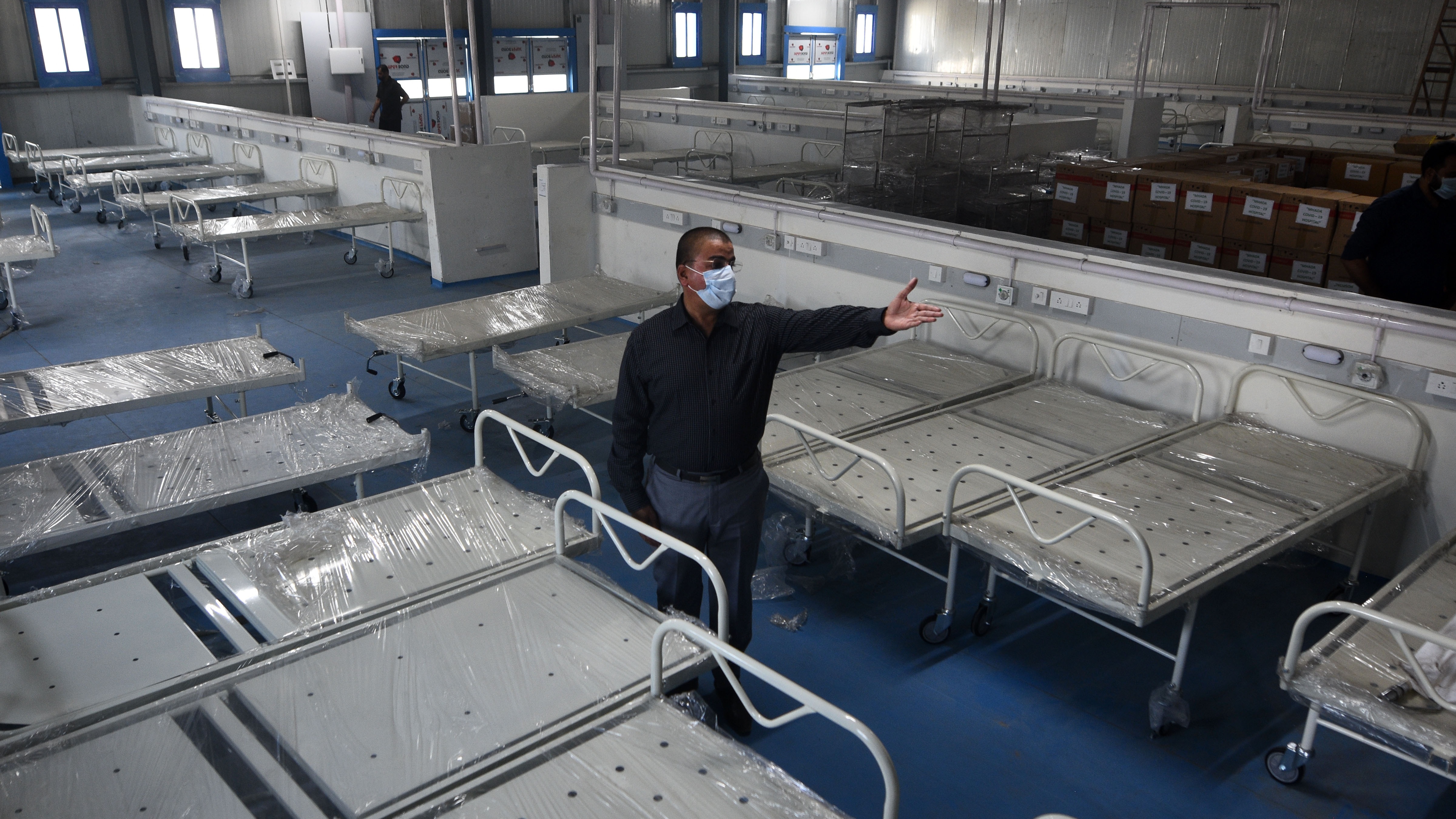India braces for Omicron ‘tsunami’
Curfews announced in Delhi and Mumbai as Covid-19 cases surge across the country

A free daily email with the biggest news stories of the day – and the best features from TheWeek.com
You are now subscribed
Your newsletter sign-up was successful
India is in the grips of a third wave of Covid-19 as the Omicron variant drives a sixfold increase in infections in just seven days, health officials have warned.
Curfews have been imposed in major cities including Delhi and Mumbai, in a bid to slow what the chief of India’s Covid task force told the country’s NDTV was a “galloping increase” in new cases.
India reported 58,097 new infections yesterday alone, and the central government has advised “all states to reactivate their Covid war rooms and strengthen health infrastructure, particularly around oxygen supply and hospital bed capacity”, said The Guardian.
The Week
Escape your echo chamber. Get the facts behind the news, plus analysis from multiple perspectives.

Sign up for The Week's Free Newsletters
From our morning news briefing to a weekly Good News Newsletter, get the best of The Week delivered directly to your inbox.
From our morning news briefing to a weekly Good News Newsletter, get the best of The Week delivered directly to your inbox.
Third wave
Almost a third of the new cases reported in India on Wednesday were in Delhi and Mumbai, where officials have already taken steps to stem the spread of the highly infectious new variant.
In the capital, “40% of hospital beds have now been reserved for Covid patients as the government announced a weekend curfew”, The Guardian reported.
Mumbai Mayor Kishori Pednekar said that his city was also preparing for a “tsunami” of coronavirus infections.
Dr N.K. Arora, chair of the National Technical Advisory Group on Immunisation, told NDTV on Tuesday that the “galloping increase in the number of Covid cases” nationwide over the past week was “indicative of the third wave” hitting “several other countries across the globe”.
A free daily email with the biggest news stories of the day – and the best features from TheWeek.com
Dr Christopher Murray, director of the Institute for Health Metrics and Evaluation at the University of Washington, told India Today that on current projections, “India could see as many infections as it saw during the Delta wave”.
The infection rate “could peak late in January or early February”, he said. In a nod to suggestions that Omicron appears milder than previous strains, he predicted that “reported cases will increase at a rate that is less than infections, because we expect the much higher fraction of asymptomatic patients will lower the infection-detection rate”.
The current surge in Covid cases is a “sombre reminder of the devastating second wave India faced in April and May”, when daily new cases reached a high of around 400,000, said the BBC.
“Delhi was among the hardest-hit cities as hospitals across the country ran out of beds and life-saving oxygen, leaving patients gasping for breath,” the broadcaster continued. “Crematoriums were overwhelmed, forcing people to hold mass burials in open spaces.”
As Omicron now spreads across the world, Soumya Swaminathan, chief scientist at the World Health Organization, told The Economic Times that India looks likely to “have a big surge”. How the next stage of the country’s battle with the pandemic will play out should become clear over the “next two weeks”, she said.
“Omicron is not the common cold,” Swaminathan warned. “Health systems can get overwhelmed. It is important to have systems to test, advise and monitor a large number of patients as the surge can be sudden and huge.”
The Indian government has called on state officials to focus on “strategic areas of intervention”, including “containment, testing, tracking, surveillance, clinical management, vaccination and following Covid-appropriate norms”, according to Uttar Pradesh-based broadcaster News18.
States are also reportedly being urged to “strengthen health infrastructure in case of a sudden surge”, as well as stressing the need to “increase bed capacity, ambulances” and “oxygen equipment”.
Vicious cycle
India’s health system was pushed to the brink during the Covid wave that hit last April, a month after a new “double mutant” variant of Covid was discovered.
The country’s trading centres quickly emerged as hotspots during the outbreak, with allegations circulating that the government was obscuring the scale of the crisis by hiding the true death toll.
“Many Indians would have loved to slam the door on 2021 with a loud bang of good riddance,” said The Economist. But there is now “no doubt that India is in for another massive wave” that threatens a repeat of last year’s chaos.
However, “India is now much better prepared” than it was nine months ago, the paper added. Latest Oxford University tracking shows that as of 4 January, 61.5% of the population had received at least one dose of a Covid vaccine, compared with less than 4.5% when the Delta variant was first reported.
But “the sheer size of India’s population, combined with crowded living conditions and the prevalence of exacerbating factors such as high rates of malnutrition, diabetes and tuberculosis, could still place millions at high risk”.
Covid task force chief Arora told Press Trust India that he expected “a somewhat similar pattern in India as far as the third wave is concerned”. The “behaviour of the Covid infection in the last seven to ten days in India” suggests “we may be in for a third wave peak very soon”, he added.
On a note of cautious optimism, Arora pointed to the situation in South Africa, where “were a high number of cases as Omicron spread quickly through communities, but where most cases were mild or asymptomatic”, said The Guardian.
South Africa’s “wave has now almost died down after a month”, the paper continued, adding that “India has a similarly young population to South Africa but has a higher vaccination rate”.
India’s “medical system is relatively well prepared” after “last year’s nightmare provided valuable lessons”, said The Economist.
But “even with milder symptoms and quicker recoveries, there is a danger that a flood of infections among medical staff could cripple health care,” the paper warned.
-
 Sepsis ‘breakthrough’: the world’s first targeted treatment?
Sepsis ‘breakthrough’: the world’s first targeted treatment?The Explainer New drug could reverse effects of sepsis, rather than trying to treat infection with antibiotics
-
 James Van Der Beek obituary: fresh-faced Dawson’s Creek star
James Van Der Beek obituary: fresh-faced Dawson’s Creek starIn The Spotlight Van Der Beek fronted one of the most successful teen dramas of the 90s – but his Dawson fame proved a double-edged sword
-
 Is Andrew’s arrest the end for the monarchy?
Is Andrew’s arrest the end for the monarchy?Today's Big Question The King has distanced the Royal Family from his disgraced brother but a ‘fit of revolutionary disgust’ could still wipe them out
-
 A Nipah virus outbreak in India has brought back Covid-era surveillance
A Nipah virus outbreak in India has brought back Covid-era surveillanceUnder the radar The disease can spread through animals and humans
-
 How music can help recovery from surgery
How music can help recovery from surgeryUnder The Radar A ‘few gentle notes’ can make a difference to the body during medical procedures
-
 Covid-19 mRNA vaccines could help fight cancer
Covid-19 mRNA vaccines could help fight cancerUnder the radar They boost the immune system
-
 The new Stratus Covid strain – and why it’s on the rise
The new Stratus Covid strain – and why it’s on the riseThe Explainer ‘No evidence’ new variant is more dangerous or that vaccines won’t work against it, say UK health experts
-
 RFK Jr. vaccine panel advises restricting MMRV shot
RFK Jr. vaccine panel advises restricting MMRV shotSpeed Read The committee voted to restrict access to a childhood vaccine against chickenpox
-
 RFK Jr. scraps Covid shots for pregnant women, kids
RFK Jr. scraps Covid shots for pregnant women, kidsSpeed Read The Health Secretary announced a policy change without informing CDC officials
-
 New FDA chiefs limit Covid-19 shots to elderly, sick
New FDA chiefs limit Covid-19 shots to elderly, sickspeed read The FDA set stricter approval standards for booster shots
-
 RFK Jr.: A new plan for sabotaging vaccines
RFK Jr.: A new plan for sabotaging vaccinesFeature The Health Secretary announced changes to vaccine testing and asks Americans to 'do your own research'